From the book A Small Price to Pay, by Harvey Yoder, © 2006 TGS International, PO Box 355, Berlin, OH. Used by permission.
Nothing to Be Ashamed Of?
“Where is my Misha?” Papa asked as he came through the door.
The six-year-old boy giggled as he huddled on the cot in the tiny living room. It was fun to hide when Papa was looking for him.
“What is that?” Papa pretended to be puzzled. “What was that noise I heard? Was it a little mouse?” Misha hid his face and squealed in delight as he heard Papa’s footsteps coming closer.
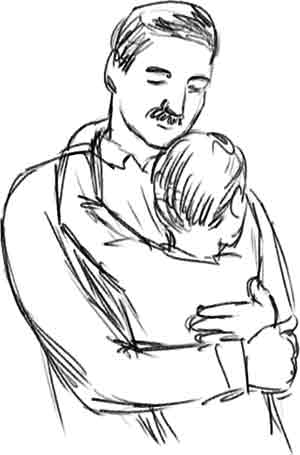
Suddenly Misha felt himself lifted up in his father’s strong arms and hugged tightly to his chest. Misha threw his arms around his neck, hugging him back. This was his favorite part of the day, when Papa came home from his night shift at the big electronics factory in Leningrad.
“Let’s go for a walk!” Misha begged, pulling on Papa’s arm as soon as he stood on the floor again. “Please, Papa! I want to go outside!” Misha did not think of how tired Papa must have been, working all night and climbing the four flights of stairs to the tiny apartment. He was just an energetic boy, and he wanted to go outside. The bright sunlight streaming through the windows called to him.
“Where shall we go?” Papa asked, smiling. He did not act tired.
Eagerly, Misha led the way down the flights of stairs, his shoes clumping on the concrete steps. As they pushed open the hall door and stepped outside, he fairly danced with joy. The breezes carried the scent of saltwater from the harbor. The summer sunshine was warm, yet not hot. And the street was filled with people.
“Where shall we go?” Papa asked again. “To the fountain?”
“Yes!” Misha replied. Just a short distance away a small fountain splashed in the middle of a courtyard. It was one of his favorite spots.
Misha could dip his hands into the pool of water or sail small leaf boats on the rippling surface.
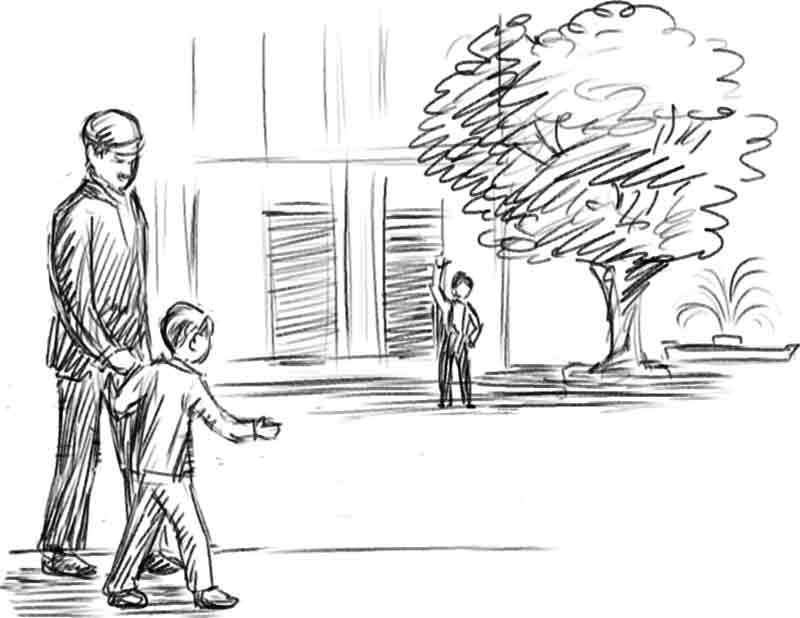
“Misha! Hey, Misha! Come here!” A neighbor boy called from across the street.
Misha turned and saw Vova’s mischievous, laughing face. “Hey!” he yelled back. Without another thought, he dropped his father’s hand and ran across the street to join his friend.

Vova started running down the sidewalk, laughing and shouting. He was several years older than Misha, and full of adventure. Around the corner of a building and into a narrow alley he ran. Then Vova stopped and knelt down beside a broken basement window.
“Crazy!” Vova yelled into the black hole. “…zee!” the echo bounced back.
Misha liked the sound. “Crazy!” he yelled, joining Vova. He laughed as the echo mocked his voice.
“You are a drunkard!” Vova yelled, and both boys laughed in delight as the echo picked up the last word.
Vova and Misha kept yelling all the words they could think of. Vova even used words that Misha had never heard of before. But it was easy to copy him and to hear the same sounds echo inside the dark hole.
“You boys! Stop that noise!” An old woman, hobbling along the street, scolded them. “Get away from here!”
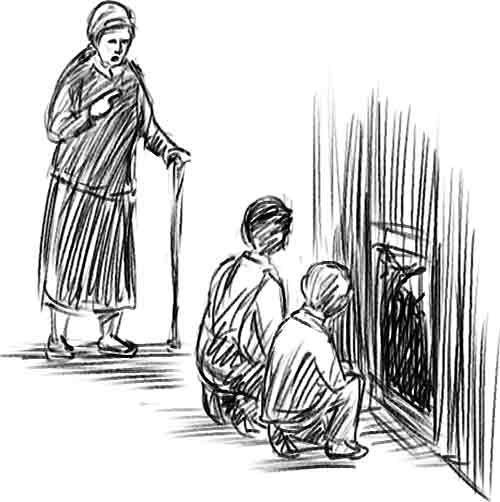
The boys sprang to their feet and Vova stuck his tongue out at the old woman. Misha did not dare follow that example, for his parents had punished him for doing it at home. Instead he followed Vova into the main street again.
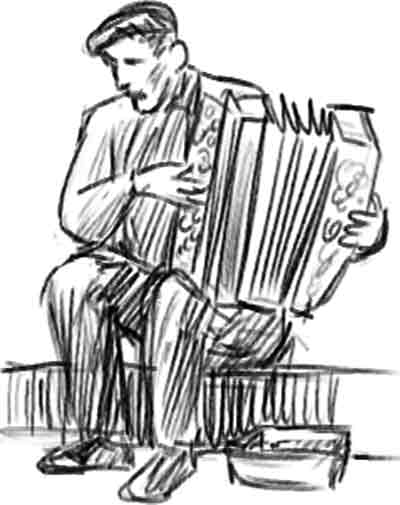
Up ahead he could see Sasha, the blind man, sitting in his usual place on his doorstep. He played a lively tune on his accordion, hoping for someone to take pity on him and throw a kopek or two into the basket beside him.
“Misha,” Vova whispered as they came closer, “I have an idea.” He dug into his pants pocket and came up with a three-kopek coin. “Do you want some candy?”
Misha looked at his friend in wonder. Candy! He nodded eagerly.
“When we get in front of old Sasha, throw this kopek into his basket. As soon as it jingles onto the other coins, grab a fifty-kopek coin from the basket. We will use that to buy candy!”
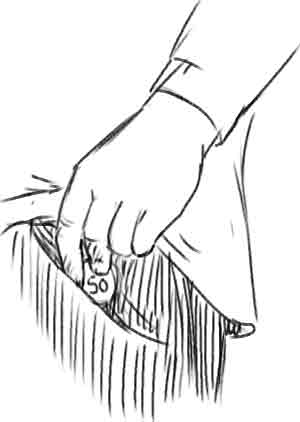
Misha did not think whether it was wrong or not. He was ready to do anything Vova suggested. He looked eagerly into the basket and spotted the coin he wanted. Then he threw Vova’s coin into the basket and grabbed the fifty-kopek piece. Misha shoved it into his pocket. Sasha could not see what had happened, and continued playing his music. Misha glanced around, but no one seemed to have noticed.
Fifty kopeks bought quite a bit of candy. Misha knew the kind he wanted. Mints. How much he enjoyed sucking on the little hard sweets! This was a rare treat. Putting the rest of the mints in his pocket, Misha followed his friend home from the candy shop.
“Misha!” He heard Papa calling when they got close to the fountain. Misha looked toward his apartment building. There was Papa standing in front of the door. “Come, Misha! It’s time to go in to eat.” Misha ran across the street and took his father’s hand. Together they went up the four flights of stairs.
After eating, Papa took Misha on his lap and told him a story from the Bible. Misha liked the stories Papa told, because he made them interesting. Today he told about Joseph and how he was put in prison for something he had not done. Then, one day, he was called before the great king of Egypt. The king had had a strange dream and wanted to know what it meant.
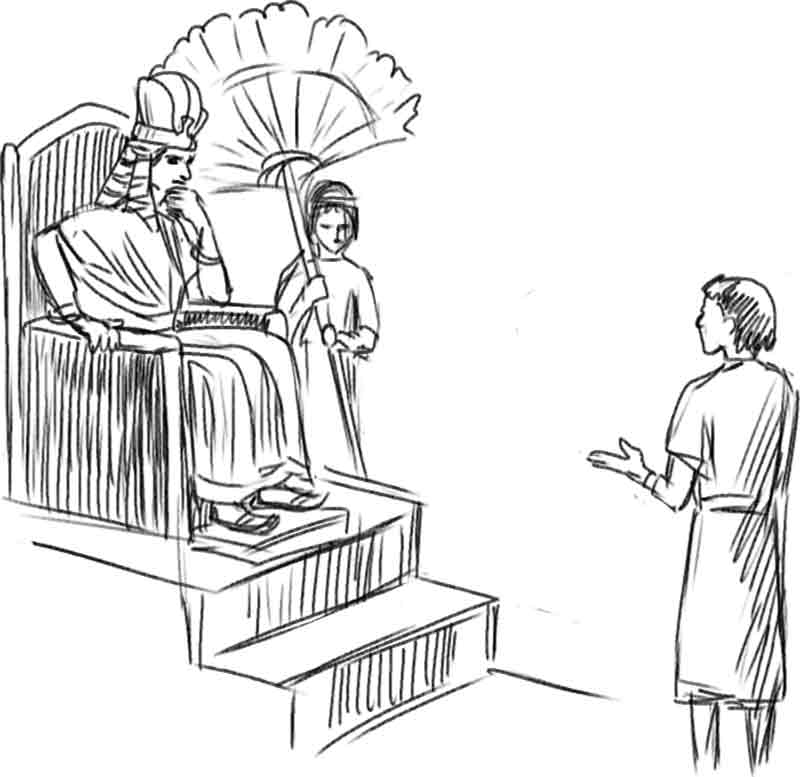
“Why do you think Joseph was not afraid of being brought to the king’s palace?” Papa asked.
“Because God was with him?” Misha asked.
His father nodded, “Yes, because God was with him. Joseph knew that he had not done anything to be ashamed of toward anyone, not even the king.” Papa looked at Misha. “What about you, my son? Do you have anything that you are ashamed of? Something that you did or said?”
Misha thought of what he had done with Vova, and quickly shook his head. He did not want to be in trouble.
Papa continued talking. “The reason Joseph could talk to anyone was because he knew he had not done anything that was wrong or shameful. He had what we call a clear conscience.” He looked at Misha. “Do you know what a conscience is?”
Misha shook his head. For some reason, that word bothered him. What was a conscience?
“A conscience is something inside you that tells you if you have done something bad. It reminds us of things we have done that we should not have done.”
Misha understood. Yes, his conscience was talking to him.
Papa was continuing the story. “When Joseph was in prison, do your remember how he helped another prisoner who was a butler? Later the butler told the king about Joseph and that is why the king let him free. We need to be kind like Joseph was to the butler. Do you know of anyone you can be kind to? Someone poor?”
Misha wiggled on Papa’s lap and shook his head.
“You can be kind to the blind man, Sasha, on the street. He cannot see, and he needs people to help him. He cannot work and is very poor. Did you ever give Sasha a kopek? Even a small coin can help him.”
Why was Papa talking about Sasha? Misha squirmed uncomfortably.
“Here is a ten-kopek coin,” Papa said, handing the money to Misha. “Put it into your pocket. Next time you see Sasha, put it into his basket. That way you can be kind to someone, just like Joseph in the story.”
Misha nodded and quietly put the coin in his pocket.
“I smell mint,” Papa said, looking at him curiously.
“Oh, that is the candy Vova gave me,” Misha said, pulling candy out of his pocket.
“Oh! Did Vova give you candy?” Papa’s voice sounded surprised, and he reached into his own pocket again. “It is not good to take advantage of our friends. The next time you see Vova, give him this coin to pay him back.”
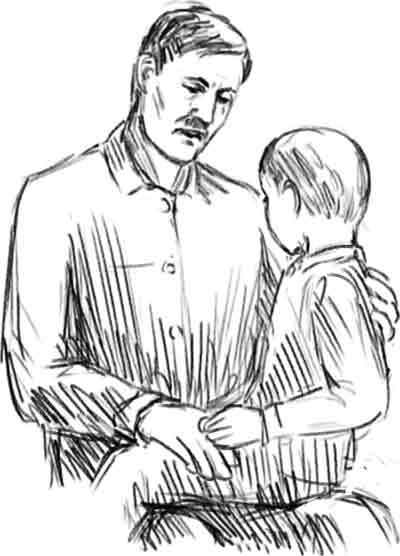
One more time Papa asked Misha, “Do you have anything you are ashamed of? Remember, Joseph could stand before anyone without fear, because he was not ashamed of anything he had ever done.”
Misha’s conscience was pricking him, but he shook his head quickly.
Papa sighed. “Sonny, when you left me to go with Vova, I watched you as you ran down the sidewalk.”
Misha felt a prickle go up his spine. Papa had seen him?
“I heard you yell bad words into the broken basement window. I was ashamed of the words that you used. Those words were bad words,” Papa said slowly and sadly. “Then I saw you take the coin out of Sasha’s basket. I was not far behind you, for I wanted to see what you and Vova were doing in your play. I saw Vova buying candy with the stolen money.”
Papa stroked Misha’s hair and his voice trembled a little.
“Misha, this makes me very sad. You thought you were having fun. But all of this was wrong. You have done something that you need to be ashamed of.”
Misha heard the sadness in his father’s voice as his hand kept stroking his hair. The prick in his conscience turned into pain inside his chest. Tears trickled down Misha’s face.
“Your mother and I have tried to teach you to be kind and good. I see that we have not yet taught you. This makes me sad, not only because of the damage it does to you, but also for what you have done to poor Sasha.”
Misha put his head on his father’s chest and cried. Papa hugged him closely.
“Misha, do you want to do something that will help you feel better?”
Misha nodded his head. Yes!
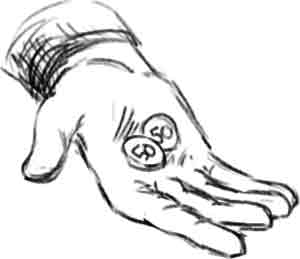
“Take two fifty-kopek pieces and put them in Sasha’s basket. Tell him that you are sorry you have stolen from him.”
One hundred kopeks. A whole ruble! Misha knew his family didn’t have much money. But Papa was not going to skimp when it was time to make things right.
Misha took the two coins from Papa and darted out the door, wiping his wet eyes on his sleeves. He clattered down the steps once more, then pushed the outer door open and went out into the street. He ran down the sidewalk.
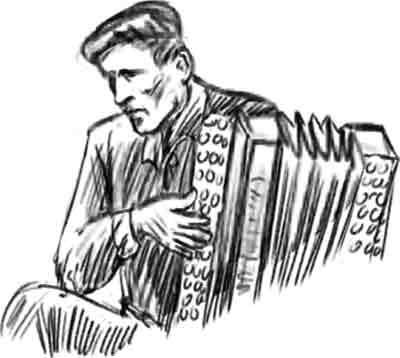
Sasha was still sitting in the same place. For the first time, Misha looked at the old man closely. His face was weary. Even as he played merry tunes on the accordion, a feeling of sadness hung over him. His clothes were ragged and dirty. When he paused in his playing, Misha went up to him.
“Sorry I stole from you,” he mumbled, and threw the two coins into Sasha’s basket. Misha turned and ran back home. How different he felt now! The heaviness inside was gone and he felt like he was flying!
Before he dashed into the apartment building again, Misha looked up to the fourth floor. He could see Papa’s face in the window, watching for him.
Waving his hand happily, he shouted, “I am coming, Papa! I am coming home!”